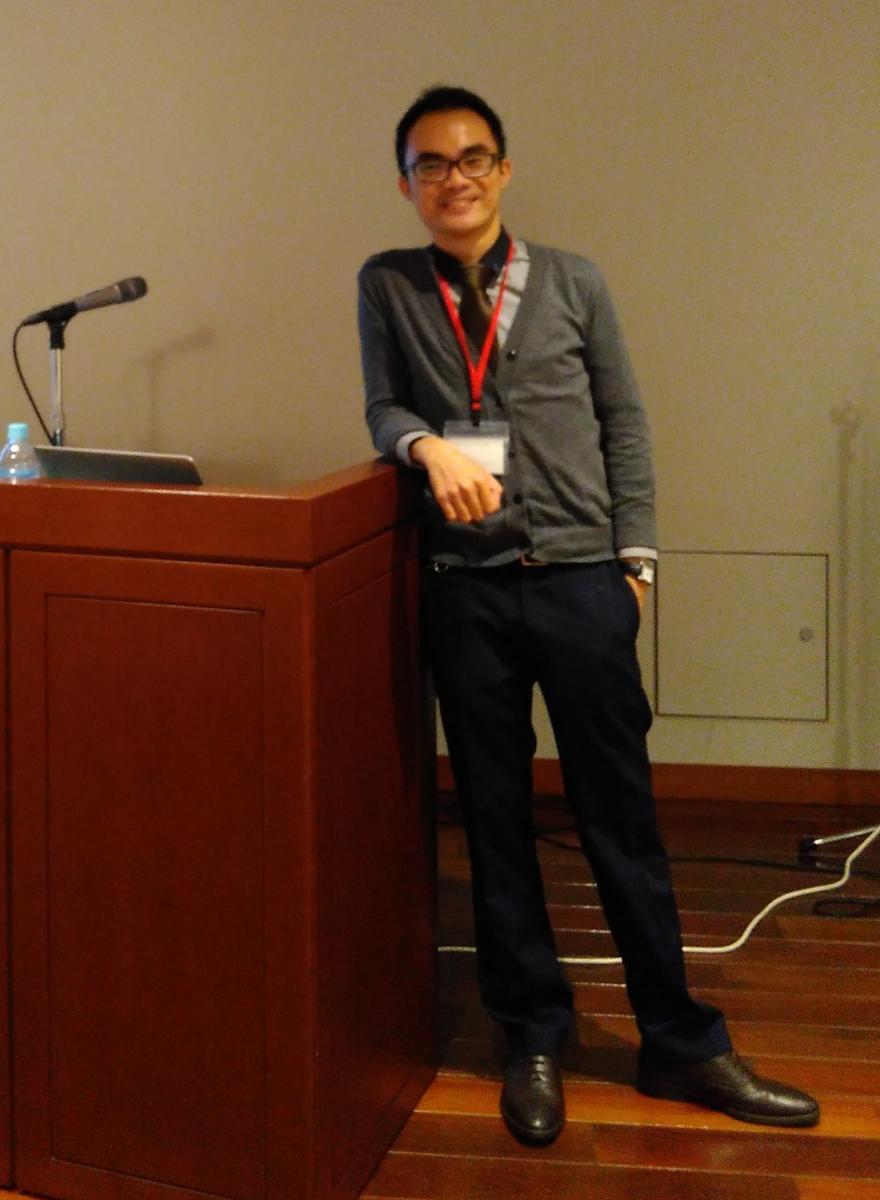Before joining Duke-NUS Medical School, Lim Ka Keat, a 3rd year PhD student in the Integrated Biology and Medicine (IBM) programme, worked for a number of years as a project manager in a research center in Kuala Lumpur. Although he developed an interest in drug discovery research during his undergraduate days as a Pharmacy student, it was his work experience of managing research projects on prescription and medication utilization that opened his eyes to the big picture of healthcare and health systems, and inspired him to explore the area of health policy.
With the encouragement of very supportive bosses, colleagues, pharmacy lecturers and his family, he first undertook a Masters in health policy and health economics in London. Thereafter, he decided to pursue his interest further, and applied to do a PhD here at Duke-NUS Medical School. We interview him to learn more about his research and its relevance to our part of the world.
 Ka Keat presenting his research work
Ka Keat presenting his research work
How did you come to know about the Duke-NUS IBM programme?
I first found out about Duke-NUS from a colleague who was thinking about pursuing an MD. As I looked up Duke-NUS Medical School online, I learnt about the IBM programme and got interested in the work done by the Health Services and Systems Research (HSSR) researchers.
I liked how the Duke-NUS PhD programme did not require prospective students to commit at a project and supervisor at the point of application, unlike most other PhD programmes that I knew about in the region. That was a plus as it gave me greater flexibility in exploring potential topics with the mentors and in designing my research project.
What is your PhD research about? How is it relevant to our region?
My PhD project is on how psychological resilience relates to the recovery of physical function after hip fracture among older adults in Singapore. I became interested in the topic of hip fracture because my grandmother had a hip fracture a few years back.
Hip fracture typically occurs among older adults who fall from a standing position and is usually associated with osteoporosis. Older adults with hip fracture lose the ability to walk and they usually need to undergo hip surgery followed by rehabilitation to help them regain mobility.
From a health system's perspective, hip fracture leads to the highest healthcare utilization and expenditure compared to other fractures. This makes it a growing public health concern worldwide because of the ageing population, particularly in Asia which is projected to contribute 45% of all hip fracture cases by 2050.
What are the applications of your research? What is your long-term goal?
In collaboration with orthopaedic surgeons and physiotherapists in the Singapore General Hospital, we are working to identify useful prognostic factors that can ultimately lead to medical interventions. The goal is to make recovery easier for older adults with hip fracture.
Beyond hip fracture, my broader interest is in aging, prevention of age-related injuries and diseases, and utilization of healthcare resources. The aging population and its associated burden on the health system is a challenge that many countries are facing or are expected to face in the near future. My long term goal is to be a health policy advisor and researcher, where I hope to work with various stakeholders of the health system - governments, healthcare providers, non-governmental organizations, and pharmaceutical companies - to improve the delivery of healthcare.
What is your current work environment like?
Open and stimulating. I am currently in the HSSR programme under the mentorship of Professor David Matchar. He always tries to make time for me despite his busy schedule and gives me room to explore and to learn. Apart from my mentor, there are also other people around that I can reach out to, exchange ideas with, seek feedback and get help from, be it within or outside Duke NUS. I really enjoy the learning environment and appreciate all the advice and support from my professors, collaborators and colleagues.
Any advice for students thinking about pursuing a PhD?
Taking on a PhD is a long commitment, especially for those in their 30s and married like myself - in the sense that you have many other commitments to juggle alongside your PhD work. (I must thank my wife for her understanding and support!) Having said that, having some work experience before starting my PhD actually strengthened my commitment and focus in my PhD work.
Feel free to drop me an email if you are considering a PhD and career in HSSR - would be happy to have a chat.
Want to know more? Contact Ka Keat at limkk@u.duke.nus.edu